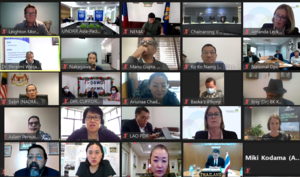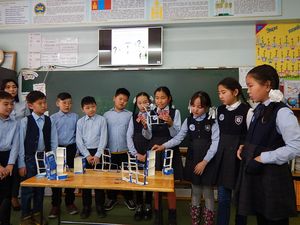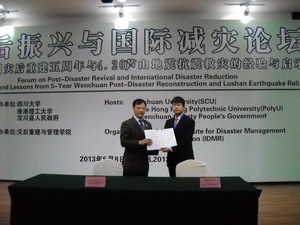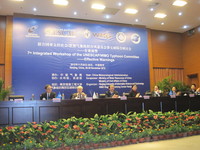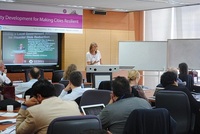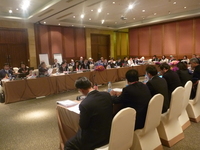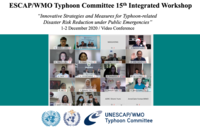
Activity Report: Area & Country >> East Asia

ADRC participated in the United Nations Office for Disaster Risk Reduction (UNDRR) Asia-Pacific Partnership for Disaster Risk Reduction Forum, which was held online on 1-2 December 2020. The meeting was held online considering the spread of the new coronavirus, however, on both the first and second days, more than 150 representatives of government organizations and related organizations from Asian countries participated and actively exchanged opinions.
At the begining of the Forum on 1 December, Ms. Mami Mizutori, Special Representative of the United Nations Secretary-General for Disaster Risk Reduction, expressed her expectations for this forum. In addition, although each country got quite huge impact of COVID-19, just as the 2004 tsunami strengthened the DRR system in Asia, she called for to use this experience as an opportunity to further strengthen disaster resilience. Next, the representative of Australia, the host country of the Asia-Pacific Ministerial Conference on DRR (APMCDRR) scheduled to be held next year, explained that they are coordinating to hold the extended Conference sometime between April to June. Also she mentioned their efforts to enhance the DRR system in Australia in response to the large-scale bush fire last year. Then, it was followed by speech of the Minister of Ministry of Health and Medical Service of Fiji on their cyclone response activity under the COVID-19 pandemic.
Subsequently, UNDRR reported on the recent trend of disaster occurence in Asia and the results of monitoring of the implementation of the Sendai Framework for Disaster Risk Reduction (SFDRR). It was stated that in order to respond to unexpected disasters and simultaneous disasters, a mutual cooperation system among more parties concerned should be established. Further they informed the situation of collection and analysis of disaster damage data is still insufficient.
In the Panel Discussion, the director of the Australian Institute for Disaster Resilience acted as a moderator, and discussions were held on the theme of risk governance in national and local governments, which have become more aware of their importance following the recent COVID-19 pandemic. Representatives from the Government of India, the Philippine local government, the Vanuatu Disability Support Group, and a researcher in the medical field made presentations from their respective standpoints. Based on the experience of responding to COVID-19, they commonly touched upon the cooperation and partnership system of various stakeholders, the establishment of a permanent cooperation and collaboration system between the health sector and the DRR sector, and the advance planning for the preparation of simultaneous disasters as important points.
At the meeting on 2 December 2, Mr. Hiroko Oura of the International Monetary Fund (IMF) gave a keynote speech on financial risk management, which is one of the themes of APMCDRR. She presented the financial risk that COVID-19 poses to the world is unprecedented, and due to various uncertainties in understanding the risk of unprecedented disasters and predicting climate change, analyzing risks is difficult. She mentioned, on the other hand, it is necessary to carry out risk management based on such a premise. In addition, although the global restriction of social activities by COVID-19 contributed to the reduction of Greenhouse Gas Emissions, it was only temporary, rather it led to the decline in corporate environmental activities due to the deterioration of corporate financial conditions.
Next, the Australian Government explained the composition of APMDRR to be implemented next year and called for the active involvement of many stakeholders.
In the latter half of the meeting, representatives from 22 countries and organizations mentioned their efforts and future prospects, such as improvement of the system to promote the implementation of SFDRR, coordination and adjustments of the system to respond to simultaneous disasters based on the experience of COVID-19.
Finally, UNDRR explained the preparatory process for APMDRR, including of thematic discussions and regional discussion with relevant stakeholders. The Asian Disaster Reduction Center will also be actively involved in this process.
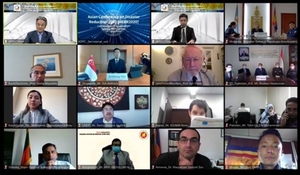
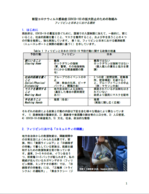
The Sentinel Asia initiative is one such activity and involves the use of space-based information in the form of satellite images for disaster management. ADRC has been tasked with the responsibility of receiving emergency observation requests from ADRC member countries and Joint Project Team (JPT) members. ADRC joined the Space Applications Working Group (SAWG) and reported on trends in Sentinel Asia emergency observation requests and its future action plans.
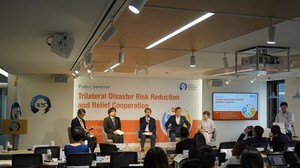
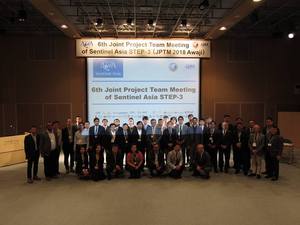
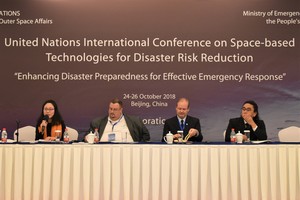
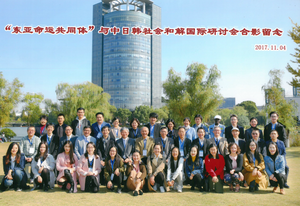
(1) This meeting is sponsored by budget regarding "One Belt, One Road" advocated by Mr. Xi Jinping, President of China;
(2) An idea of "Community of Shared Future (Word which translated Chinese '命运共同体' in English)" of the theme of meeting is an important pillar of Xi Jinping's idea;
(3) Although some worry recent Chinese diplomacy in East Asia as a threat, the present government attaches a great importance on the trilateral relationships in north-eastern Asia and will never become a threat for eastern Asia, as seen in the title of this meeting,
He stressed that, the present government successfully organized the 19th National People's Congress on October 24th prior to this meeting, has established a firm footing and ready to further improve the trilateral relationships in the future under the stable framework.
Session 1: "Constructing A Community of Shared Future in East Asia: Potentials and Challenges I"
Session 2: "Constructing A Community of Shared Future in East Asia: Potentials and Challenges II"
Session 3: "The Practice of Constructing a Community of Shared Future in East Asia I"
Session 4: "The Practice of Constructing a Community of Shared Future in East Asia II"
<2nd day, 5 November>
Liujiatang Village located on the riverside, has strived for improving water environment and promoted converting to flushing toilet in houses through early installation of septic tanks of combined treatment since the village has been designated as national environmental protection areas.
Yu Village has been revitalized to be an environmental conservation area by closing the mines and switching its industries to bicycle assembly and bamboo products. It is no exaggeration that these two villages are Xi Jinping's original sceneries, who was once the Secretary General of Communist Party in Zhejiang Provincial Government.
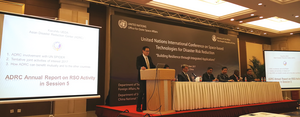 The 7th Annual UN-SPIDER Conference, jointly organized by the United Nations Office for Outer Space Affairs (UNOOSA) and the Ministry of Civil Affairs of the People's Republic of China, was held in Beijing on 23-25 October 2017. The event gathered almost 100 participants, including representatives of Space Agencies and Disaster Management Organizations from 34 countries and eight regions, who visited relevant organizations as a part of the three-days' program. ADRC representative attended the meeting from Day 2 afternoon, since the originally planned flight to Beijing on 22th canceled due to Typhoon.
The 7th Annual UN-SPIDER Conference, jointly organized by the United Nations Office for Outer Space Affairs (UNOOSA) and the Ministry of Civil Affairs of the People's Republic of China, was held in Beijing on 23-25 October 2017. The event gathered almost 100 participants, including representatives of Space Agencies and Disaster Management Organizations from 34 countries and eight regions, who visited relevant organizations as a part of the three-days' program. ADRC representative attended the meeting from Day 2 afternoon, since the originally planned flight to Beijing on 22th canceled due to Typhoon.The theme of session 3 from afternoon on Day 2 was "Technology integrated for disaster risk assessment and emergency response". Each participant reported their activities including Food and Agriculture Organization of the United Nations (FAO), Beijing Normal University, "Continuum Planning and Development Trust, India" a Non-Profit Organization, and Ministry of Home Affairs, India. Amongst all, in the report of FAO, they proposed indicators influencing decision making for food aid by focusing on assessment of situation within seventy-two (72) hours after disaster occurrence, by learning from the cases of "Cyclone Pam" (Vanuatu, March 6, 2015) and "The Great Southern Asia Flood" (Bangladesh, August-September / Sri-Lank May / Nepal, August, 2017).
ADRC joined the session entitled "Integrated emergency response tools/systems" among the parallel session after break. In this session, World Vision International, Department of Civil Protection, Zimbabwe, and National Institute of Aeronautics and Space, Indonesia (Lembaga Penerbangan dan Antariksa Nasional - LAPAN) provided their reports. LAPAN reported about landslides that hit Banjarnegara, Central Java every year and expressed their appreciation for the contribution of Sentinel Asia in the presentation.
<25th October>
On the final day of the conference, plenary session 4 and 5 took place in the morning and site visits in the afternoon.
The session 4 discussed "Integrated applications of earth observation, global navigation satellite system and telecommunication constellations for disaster risk reduction and climate change related extreme hazards" and Newcastle University (England), Beijing University (China), and Delta University (USA) provided their reports.
The report of Newcastle University was about the analysis of landslide by Interferometric SAR in Xinmo village, Mao counter, Ngawa Tibetan and Qiang Autonomous Prefecture, Sichuan Province, China, while Beijing University reported about the analysis of the affected areas by the Kumamoto Earthquakes by using Polarimetric SAR in (ALOS PALSAR PolSAR, April 21, 2016). Both reports emphasized the expectation for further use of Synthetic Aperture Radar (SAR) satellite for emergency response, enabling assessment of affected situation easier.
In the afternoon, participants were divided into two groups, one visited the National Disaster Reduction Center of China, and another, China Academy of Space Technology (CAST) Exhibition Center. ADRC representative joined the former.
ADRC visited the Institute of Geology, China Earthquake Administration (CEA) to make an interview about Emergency Observation Request (EOR) for Jiuzhaigou Earthquake in August this year.
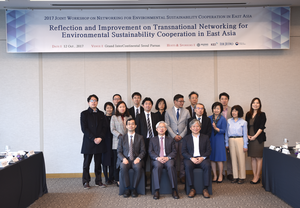
Accordingly, the final goal is to build the networks of individual fields of non-traditional security including cyberspace, environment, nuclear safety and disaster risk reduction, which will contribute to build a traditional security in north-eastern Asian region by taking into consideration of North Korea, and search for feasibility of peaceful cooperation in north-eastern Asian region, by highlighting three policy priorities: (1) traditional and non-traditional security, (2) economic cooperation with North Korea, Russia and Mongolia, and (3) economic cooperation with the southern Asia and ASEAN. Especially, the international cooperation on the environmental field has very long history and a considerable outcome of studies by the academic circles in North Eastern Asian Region and the important agreements in the Trilateral Environmental Ministerial Meeting (TEMM) have been achieved. Nevertheless, a consensus has not yet been well built on the effective policy agenda.
Based on those situations, this meeting was held as the "Track 2 conference" in order to explore future prospects about networking in the field of environment by learning also from efforts made in the fields of nuclear safety, disaster risk reduction and others.
Makati City, Philippines (November 25, 2016)

Along with UNISDR-GETI, the IRP/ADRC introduced a continuity planning tool that will help: (i) ensure that local government can perform its essential functions under all conditions; (ii) reduce the loss of life and minimize property damage and loss; (iii) execute a successful order of succession with accompanying authorities in the event a disruption renders that organization's leadership unable, unavailable, or incapable of assuming and performing their authorities and responsibilities of office; (iv) reduce or mitigate disruptions to operations; and (v) ensure that there are facilities from where the city government can perform its essential functions.
About 75 personnel, representing various departments of the city government, participated in the workshop. To complement the continuity planning tool, sharing of business continuity planning (BCP) experiences from various local organizations in the Philippines were presented. The sharing included those from the Metro Manila Development Authority (MMDA), Nestle Philippines, PricewaterhouseCoopers (PwC), San Juan City Government, Philippine Disaster Resilience Foundation (PDRF), and Business Continuity Managers Association of the Philippines (BCMAP).
After various inputs, participants identified the key priorities to be covered in the continuity plan for the Makati City Government. This includes setting up remote facility from where the city government's Disaster Risk Reduction Management Office (DRRMO) can operate its essential functions in case the city will be severely impacted by disasters. The participants also gave priority in outlining a definitive procedure for executing a successful order of succession whenever the head is incapable.
To forward the recommendations reached at the workshop, the city's DRRMO officials along with the representatives of all departments of the city government will reconvene sometime in March 2017 to review its progress and to further discuss the finalization of the Makati City Continuity Plan.
(2016/11/30 14:40)
19-22 September 2016 (Beijing, China)
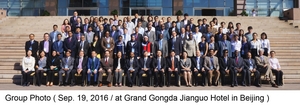 The 6th Annual UN-SPIDER Conference, jointly organized by the United Nations Office for Outer Space Affairs (UNOOSA) and the Ministry of Civil Affairs of the People's Republic of China, was held in Beijing on 19-21 September 2016. The event gathered about 130 participants, including representatives of Space Agencies and Disaster Management Organizations from 35 countries, who visited relevant organizations as part of the three-day program.
The 6th Annual UN-SPIDER Conference, jointly organized by the United Nations Office for Outer Space Affairs (UNOOSA) and the Ministry of Civil Affairs of the People's Republic of China, was held in Beijing on 19-21 September 2016. The event gathered about 130 participants, including representatives of Space Agencies and Disaster Management Organizations from 35 countries, who visited relevant organizations as part of the three-day program.
<First Day: 19th September>
The key officials at the inauguration included: Mr. Benjie Yin (Deputy Director, General Office of China National Commission on Disaster Reduction) who delivered the opening remarks; Ms. Mei Chai (Deputy Director-General, Department of International Cooperation, Ministry of Civil Affairs) who served as moderator; and Dr. Shirish Ravan (Secretary-General, UN-SPIDER Beijing Office) who provided an overview of sessions to be covered in the three-day program.
The sessions of the first day were "Building on UN-SPIDER 10 Years' Achievements" and "Risk Assessment and Mapping Using Earth Observation Data". There was presentation prior to each of these topics' discussions. In second session for instance, the value of radar sensing on satellite technology was highly evaluated, and the accuracy of drought prediction was discussed, which needs to be improved through observation and data accumulation.
<Second Day: 20th September>
The morning sessions of the second day were "Access to Data and Information for Risk Assessment" and "National Spatial Data Infrastructure and Data Framework to Support Disaster Management". The morning sessions highlighted the contribution of satellite data for flood and drought monitoring and prediction. Hence, initiatives such as the introduction of "GAOFEN", with series of high resolution earth observation satellite system in China, needs to be effectively promoted.
In the afternoon, three breakout sessions were organized, namely: "Monitoring indicators against the global targets of the Sendai Framework", "Procedural guidelines for sharing space-based information during emergency response", and "Crowd-source Mapping for risk assessment and emergency response". ADRC representative participated in the second breakout session, and reported the importance of proactive participation in learning events and capacity building enhancement in each country to facilitate sharing of space-based information.
<Third Day: 21th September>
The morning session of the third day was about "Networking and Engagement with the UN-SPIDER Network", where reports from Regional Support Offices (RSOs), including ADRC, as well as country reports were presented. In the afternoon, two separate site visits were organized - one group visiting the National Disaster Reduction Center of China (NDRCC) and the other group visiting the Yungang Satellite Earth Station. ADRC representative joined the first group that also visited the UN-SPIDER Beijing Office.
After the conference, the ADRC representative took the opportunity to visit his colleague of the NDRCC in the morning (9:30 - 11:00) of following day to discuss further strengthening of ADRC-NDRCC cooperation. She is the former ADRC Visiting Researcher(FY 2007) and is currently Director of Data Center, Satellite Application Center for Disaster Reduction at NDRCC.
In the afternoon (12:30 - 14:00) of the same day, a visit to the Executive Director of the Integrated Research on Disaster Risk (IRDR) was also made to explore ways for collaboration and cooperation in improving collection of information.
Participation in this conference has helped to strengthen ADRC organizational networks with relevant countries and organizations as well as build wider human relations.
(2016/09/23 19:30)
29-30 May 2013 Seoul, KOREA

ADRC participated in the 8th Meeting of Typhoon Committee Working Group on Disaster Risk Reduction which was jointly organized by United Nations Economic and Social Commission for Asia and the Pacific (UNESCAP), the World Meteorological Organization (WMO) Typhoon Committee Secretariat, and the National Emergency Management Agency of the Republic of Korea in Seoul on 29-30 May 2013.
The about 30 participants who attended the meeting included representatives from China, Japan, Malaysia, Philippines, Republic of Korea, Viet Nam, Hong Kong and Macao Special Administrative Regions, as well as representatives from the organizing institutions and so on.
During the meeting, participants discussed future activities of the working group, such as "Synergized Standard Operating Procedures for Coastal Multi-hazards Early Warning System (SSOP)" project which cooperates with ADRC, and strengthening international cooperation, etc.
The Typhoon Committee has two other working groups on meteorology and hydrology, in addition to the working group on disaster risk reduction.
(2013/06/03 19:40)
8-11 May 2013 (Chengdu, China)
The Forum on Post-Disaster Revival and International Disaster Reduction -Experience and Lessons from 5-Year Wenchuan Post-Disaster Reconstruction and Lushan Earthquake Relief, organized by the Sichuan University, and the Hong Kong Polytechnic University, was held in Chengdu, China in May 2013. As a cooperation of this forum, the ADRC sent one representative from IRP secretariat to attend. The forum's over 300 participants included experts from government officials and academic experts across China.
During the keynote speech, Mr. Shingo Kouchi, ADRC Senior Expert as well as IRP Senior Recovery Expert, valued the Government and people of China's high ability to promote recovery and reconstruction efforts following the Wenchuan Earthquake that struck Sichuan Province in May 2008. Mr. Kouchi also noted that ADRC and IRP have long been in help to China's efforts to utilize Japanese technologies, experiences, and lessons related to earthquake disaster risk reduction.
Mr. Kouchi also emphasized the importance of everyday preparedness by citizens, in addition to the government efforts, when a massive disaster strikes. In this connection, the Lushan Earthquake which occurred in late April showed the evidence of progress of disaster reduction and preparedness since five years ago.
On occasion of commemorating the fifth anniversary of the Wenchuan earthquake, the Sichuan
U - The HK PolyU Institute for Disaster Management and Reconstruction (IDMR) has been established. Followed by the opening ceremony, signing ceremony of MoU between ADRC and IDMR was held. The purpose of ADRC and IDMR is to promote smoothly the releasing and sharing of information related to disaster prevention and post-disaster reconstruction, developing of disaster prevention and post-disaster reconstruction programs and educating talents in the field of disaster prevention and post-disaster reconstruction. The two parties will be dedicated to cooperation and mutual participation in the following activities;
(1) Promote personnel exchanges by mutual reception of research staff, faculty and students related to activities of both parties.
(2) Give priority to research projects with mutual participation to promote collaborative research.
(3) Promote the implementation of joint activities including the releasing and sharing of information on research results and professional knowledge.
The ADRC, together with the IDMR, would like to continue to support efforts to strengthen the disaster reduction capabilities of the affected communities.
(2013/06/11 14:50)
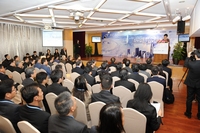
The Asian Disaster Reduction Center (ADRC), participated in the 45th Session of the Typhoon Committee which was jointly organized by the United Nations Economic and Social Commission for Asia and the Pacific (UNESCAP), the World Meteorological Organization (WMO) Typhoon Committee Secretariat, the Hong Kong Observatory in Hong Kong on 27-29 January 2013. The more than 100 participants who attended the meeting included representatives from Cambodia, China, Japan, Lao, Malaysia, Philippines, Republic of Korea, Thailand, US, Viet Nam, and the Macao Special Administrative Regions, as well as representatives of the organizing institutions. The participants discussed action plan of this committee in next fiscal year as well as their countries' activities in this fiscal year.
The Typhoon Committee has three working groups on meteorology, hydrology and disaster risk reduction (DRR). The DRR group which ADRC participated reported the SSOP (Synergized Standard Operating Procedures for Coastal Multi-Hazards Early Warning System) project in this session. This project, in which ADRC plans to participate, will be carried out in earnest from next fiscal year.
For more information, visit
http://www.typhooncommittee.org/45th/index.html
(2013/1/27 19:40)
26-27 November 2012 (Nanjing, CHINA)
ADRC participated in the 7th Integrated Workshop of the Typhoon Committee which was jointly organized by the United Nations Economic and Social Commission for Asia and the Pacific (UNESCAP), the World Meteorological Organization (WMO) Typhoon Committee Secretariat, the China Meteorological Administration (CMA), and Nanjing University of Information Science & Technology (NUIST) in Nanjing on 26-27 November 2012. The more than 100 participants who attended the meeting included representatives from Japan, Lao, Malaysia, Philippines, Republic of Korea, Thailand, US, Viet Nam, Hong Kong and the Macao Special Administrative Regions, as well as representatives of the organizing institutions. The participants discussed their approaches to issuing "effective warnings," which was the main theme of the meeting. For the Disaster Risk Reduction Working Group, Japan's Cabinet Office gave a presentation on the damage caused by typhoons in 2012 and on ADRC activities such as the Visiting Researcher Program.
The Typhoon Committee has two other working groups on meteorology and hydrology, in addition to the working group on disaster risk reduction. This workshop brought the three working groups together for an integrated meeting.
For more information, visit
http://www.typhooncommittee.org/IWS_Nanjing/index.html
(2012/11/30 19:40)
10 November 2011 (Incheon, Korea)
The ADRC was invited to the International Conference on Disaster Risk Reduction Legislation and Policy as part of the Asian Forum of Legislative Information Affairs (AFOLIA). The Conference was organized by the Ministry of Government Legislation in cooperation with the National emergency Management Agency.
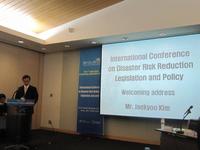 Specifically, the ADRC made a presentation on "Disaster risk reduction legislation and policy in Japan" at Part I "Disaster risk reduction legislation and policy in Korea, China and Japan and cooperative measures" of the Conference. Other participants include representatives from Chinese government, UN and various organizations and universities The Forum was the first of its kind organized by the Ministry of Government Legislation and encompassed many areas, not only disaster risk reduction but many other fields as well. It manifested a strong initiative being taken by Korean Government within Asia.
Specifically, the ADRC made a presentation on "Disaster risk reduction legislation and policy in Japan" at Part I "Disaster risk reduction legislation and policy in Korea, China and Japan and cooperative measures" of the Conference. Other participants include representatives from Chinese government, UN and various organizations and universities The Forum was the first of its kind organized by the Ministry of Government Legislation and encompassed many areas, not only disaster risk reduction but many other fields as well. It manifested a strong initiative being taken by Korean Government within Asia.
While an interest in a post HFA (Hyogo Framework for Action) 2005-2015 and a need to establish international disaster response laws (IDRL) were growing, discussion on disaster legislations at the Conference was indeed significant and meaning attempt.
(2011/11/12 13:10)
7-8 November 2011 (Taipei, Taiwan)
The 2011 International Workshop on Emergency Management was organized by the Ministry of Interior, Government of Taiwan from 7 to 8 November 2011 in Taipei city.
Ten government officials and specialists on Disaster Emergency Management, including a ADRC's researcher, were invited to the workshop to make presentations and speeches. The ADRC explained the importance of business continuity plan (BCP) in the private sector for the regional resilience while other speakers presented case study on the response and recovery phase of large scale disasters both man-made and natural.
About 200 officials, experts participated in the workshop and actively exchanged views and opinions among them, demonstrating their strong interests in disaster risk management.
(2011/11/09 11:30)
31 Oct - 2 Nov 2011 (Beijing, China)
18 October -21 October 2011 (Beijing, China)
ADRC participated in the Seminar on East-Asia Earthquakes Studies - Earthquakes, Tsunamis and Volcanoes in Northeast Asia: International Collaboration and Regional Capacity Building for the Forecast, Preparedness and Early Warning.
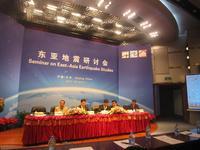 The Seminar was organized jointly by the China Earthquake Administration (CEA), the Japan Meteorological Agency (JMA), and the Korea Meteorological Administration (KMA). It was a first attempt of this kind.
The Seminar was organized jointly by the China Earthquake Administration (CEA), the Japan Meteorological Agency (JMA), and the Korea Meteorological Administration (KMA). It was a first attempt of this kind.
The Seminar addressed key scientific and technological issues in need of special consideration for forecast, preparedness and early-warning of earthquakes, volcanoes and tsunamis, especially for Northeast Asia. Experts from not only China, Korea and Japan but also from other countries in Asia and other regions participated and examined relevant issues based on their experiences, most notably the 2008 Wenchuan Earthquake in China and the 2011 Great East Japan Earthquake and Tsunami.. Mr. Atsushi Koresawa of the ADRC presented "Policy Response to Great East Japan Earthquake" in the "Communicating with the Public" session.
The Seminar was successfully closed by reaching a consensus that collaborate need to be continued and strengthened among China, Korea and Japan and with other countries in Asia to further enhance scientific knowledge and relevant technologies against seismic hazards.
(2011/10/22 13:10)
25-28 October 2010, Incheon, Republic of Korea
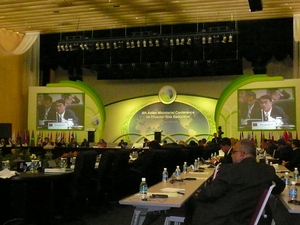 ADRC participated in the 4AMCDRR held in Incheon, Republic of Korea from 25 - 28 October 2010. More than 900 participants comprising ministers of disaster management from 53 Asia-Pacific and European nations, representatives from UN agencies, international organizations, and NGOs attended the conference. The Prime Ministers of Republic of Korea and Kingdom of Bhutan were among the high level participants.
ADRC participated in the 4AMCDRR held in Incheon, Republic of Korea from 25 - 28 October 2010. More than 900 participants comprising ministers of disaster management from 53 Asia-Pacific and European nations, representatives from UN agencies, international organizations, and NGOs attended the conference. The Prime Ministers of Republic of Korea and Kingdom of Bhutan were among the high level participants.
Under the theme "Disaster Risk Reduction through Climate Change Adaptation" (DRR through CCA), the conference was organized into three sessions: Session 1 "Raising awareness and building capacity for DRR & CCA", Session 2 "Developing and sharing information, technology, sound practices, and lessons learned in climate & disaster risk management", and Session 3 "Promoting integration of DRR & CCA into development for green growth". ADRC chaired Technical Session 1 and co-chaired the High Level Round Table of Session 1 (HLRT1) with the Maldives and Bhutan.
The outcomes of the technical session emphasized two key concerns. One is the need for training for both government officials and civil society organizations. The other is the need to learn from local and indigenous peoples on how they manage risk and the need to support their efforts in raising awareness. In this regard, it was suggested that DRR and CCA should be framed within local and national development planning. At the HLRT1, the ministers expressed problems of their countries, including issues on raising awareness and building capacity. HLRT1 recognized that problems vary from country to country, and that solutions need to be localized. HLRT1 had drawn commitments from delegates to work together and share technical knowledge. Recommendations from Technical Session and HLRT1 were reflected into the conference outcome documents: Incheon Declaration, Incheon Regional Roadmap or REMAP, and Incheon Action Plan aimed at establishing climate resilient disaster risk management systems by 2015 that will contribute to sustainable development at the regional, national and community levels.
ADRC also co-organized various side events at 4AMCDRR including "Incorporating space-based information and technologies into DRR and CCA" with UNOOSA, "Asian Film Festival on Disaster Management" with GFDR and ADPC, and "A tool for Better Recovery: Introduction to Guidance Notes on Climate Change Adaptation and Recovery" with IRP. The next AMCDRR will be held in Indonesia in 2012 and the progress of REMAP will be reviewed accordingly.
For more information on ADRC's activities during the 4th AMCDRR, please see the ADRC Highlights to be issued shortly.
(2010/10/25 16:50)
22-23 September 2010 (Chengdu, China)
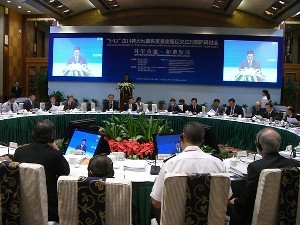
The International Symposium "5.12 Massive Wenchuan Earthquake Reconstruction & Catastrophic Disaster Control" was held in Chengdu, China on 22 and 23 September 2010. The event was jointly organized by the Provincial People's Governments of Sichuan, Shanx, and Gansu and the Chinese Academy of Governance. Mr. Onishi, Senior Administrative Manager of Asian Disaster Reduction Center (ADRC) was invited to participate.
Around 130 representatives from international organizations, national and local governments, and experts from 30 countries and organizations in America, Europe, and Asia attended the symposium. On day 1, the participants visited the reconstruction sites in Yingxiu town, Shuimo town, and Dujiangyan city to look at the progress of recovery. On day 2, presentations concerning the theme "Scientific Reconstruction and Harmonious Development" were made. The title of Mr. Onishi's presentation is "From Resilient Recovery to Sustainable Development: Development of Recovery and Rehabilitation Measures".
(2010/09/22 19:20)
15-17 September 2010(Seattle, USA)
This program was jointly organized by Peace Winds America (NPO) and the City of Seattle, and was held from 15-17 October at the Seattle Office of Emergency Management. The program aimed to promote the sharing of experiences and ideas regarding natural disasters and emergency management between local government officials in the US and Japan.
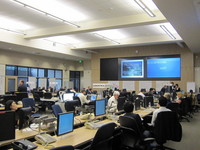 The Asian Disaster Reduction Center (ADRC), at the request of the organizers, provided help with the coordination of the participating organizations from Japan. Also, ADRC gave a presentation on "Government Coordination" in Japan and facilitated discussions throughout the program.
The Asian Disaster Reduction Center (ADRC), at the request of the organizers, provided help with the coordination of the participating organizations from Japan. Also, ADRC gave a presentation on "Government Coordination" in Japan and facilitated discussions throughout the program.
The participants included Japanese officials from the Ministry of Defense, Osaka Prefecture and the City of Osaka, Hyogo Prefecture and the City of Kobe, and Hiroshima Prefecture and the City of Hiroshima, as well as American representatives from the Federal Emergency Management Agency (FEMA), the City of Seattle, King County, the City of Honolulu, Microsoft, Boeing, and other organizations. The participants gave presentations on their own experiences and the outlook for the future from the viewpoint of those who are doing practical disaster management work on the ground. The Japanese participants were particularly impressed with the collaborative frameworks that have been developed in the US to enable local governments, private companies, and NGOs to work together.
This exchange program is expected to become an annual event and thus is expected to prove highly useful to both US and Japanese local governments long into the future.
(2010/09/18 13:10)
13 August 2010 (Incheon, Republic of Korea)
Steering Committee for the fiscal year 2010 of Asian Disaster Reduction Center was held in Incheon City, Korea on August 13. Representatives of 19 member countries attended.
Mr.Tomoya Nagai, the new Director for Disaster Preparedness, Public Relations and International Cooperation, Cabinet Office of Japan, chaired the steering committee meeting. At the beginning of the meeting, he expressed sympathy to victims of recent disasters in Pakistan, China, and India and also expressed strong support to the affected governments on behalf of ADRC. The chair formally announced the Republic of Maldives as the 29th member country of ADRC, which officially joined in May 2010.
After the presentation of ADRC activities for fiscal year 2010, the member countries discussed on how to further promote ADRC activities.
(2010/08/13 19:20)
11-13 August 2010 (Incheon, Republic of Korea)
The ADRC attended the ISD R Asia Partnership (IAP) Meeting held from 11 to 13 August 2010 in Incheon, Republic of Korea. The meeting was organized to speed up the preparations for the Fourth Asian Ministerial Conference on Disaster Risk Reduction (AMCDRR) scheduled on 25-28 October 2010 at Songdo ConvensiA in Incheon, Republic of Korea. The main themes, procedures, and expected outcomes of 4th AMCDRR were among the key items discussed and examined at the meeting.
R Asia Partnership (IAP) Meeting held from 11 to 13 August 2010 in Incheon, Republic of Korea. The meeting was organized to speed up the preparations for the Fourth Asian Ministerial Conference on Disaster Risk Reduction (AMCDRR) scheduled on 25-28 October 2010 at Songdo ConvensiA in Incheon, Republic of Korea. The main themes, procedures, and expected outcomes of 4th AMCDRR were among the key items discussed and examined at the meeting.
The ADRC has been actively involved in drafting outcome documents, and will be chairing Technical Session 1 "Raising awareness and building capacity for disaster risk reduction (DRR) and climate change adaptation (CCA)" at the 4th AMCDRR. In addition, the ADRC has been also co-organizing few side events such as "Incorporation of space-based information to support DRR and CCA" and "Introduction to Recovery Guidance Notes on CCA" with UNOOSA and International Recovery Platform (IRP) respectively.
Following the discussions at the preparatory meeting, the ADRC will further strengthen the preparations for Technical Session 1 and side events.
(2010/08/11 16:50)
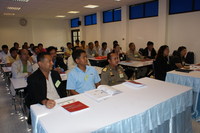
Thailand's Department of Disaster Prevention and Mitigation (DDPM), Ministry of Interior and Asian Disaster Reduction Center (ADRC) organized a workshop targeting local government officials in its southern province Songkla.
On 19-20 July 2010, a total of 30 local officials gathered at a Songkla Campus of Disaster Prevention and Mitigation Academy in the province to take lectures on disaster risk management and countermeasures and visit disaster-prone areas for making hazard maps.
With the lead by experienced Trainers, who are government officials themselves, the workshop brought about active participation in the program which was co-developed by DDPM and ADRC. The participants reassured the importance of both structural and non-structural measures during the activities.
This workshop is part of capacity building program of local government officials for ASEAN countries, under which DDPM and ADRC have prepared since 2009 for further promoting capacity development in the country. Followed by this batch, similar workshops are scheduled in northern and north-eastern provinces this year.
(2010/08/05 17:40)
5-8 July 2010, Manila, Philippines
Sentinel ASIA Joint Project Meeting(JPTM) was held in Manila, the Philippines on 5-8 July 2010. It was organized jointly by Japan Aerospace Exploration Agency (JAXA), United Nations Economic and Social Commission for Asia and the Pacific (UNESCAP) and Department of Science Technology (DOST), Gov. of the Philippines. 71 people from 22 countries (36 organizations) and 5 international organizations participated in the meeting.
ADRC functions as a single window to receive emergency observation request for their screening and onward transmission to space agencies in the framework of Sentinel ASIA. At the meeting, ADRC reported the status of the emergency observations that were implemented in the last ○○ months, the results of survey on how provided satellite data was utilized in each country, and the current situation of the ADRC GLOF project. The themes of discussion in this meeting are as follows:
Progress of Sentinel Asia step2
Current situation of each JPT member
Activities of Forest fire Working Group
Activities of Flood Working Group
Activities of Glacier Lake Outburst Flood (GLOF) Working Group
Collaboration with Sentinel Asia and International Disaster Charter
ADRC will continue to promote the use of satellite data utilization for disaster reduction in Asia in cooperation with Sentinel Asia secretariat. For more details of this meeting, please refer to the Sentinel ASIA web site.
(2010/08/02 13:20)
17-18 June 2010 (Bangkok, Thailand)
The ADRC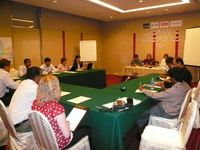 participated in the "Orientation Training on the Use of DRR Project Portal" developed under the IAP initiative on Regional Stocktaking and Mapping of DRR interventions, held in Bangkok, Thailand on 17-18 June 2010. The training was organized by the Asian Disaster Preparedness Center (ADPC) in partnership with UNISDR and with support from the Asian Development Bank (ADB). Approximately 30 officers from IAP members and other organizations in Asia and the Pacific joined the training.
participated in the "Orientation Training on the Use of DRR Project Portal" developed under the IAP initiative on Regional Stocktaking and Mapping of DRR interventions, held in Bangkok, Thailand on 17-18 June 2010. The training was organized by the Asian Disaster Preparedness Center (ADPC) in partnership with UNISDR and with support from the Asian Development Bank (ADB). Approximately 30 officers from IAP members and other organizations in Asia and the Pacific joined the training.
In the training, participants learnt about the DRR Project Portal, including its usage, and also discussed on possible ways to increase the use of the DRR Project Portal and challenges in updating information. This portal is expected to contribute to promoting coordination and collaboration among DRR practitioners in Asia and the Pacific, avoiding duplications of activities, and better planning and programming in Asia and the Pacific.
The ADRC would like to provide support to the portal and contribute to further promoting it among DRR practitioners in Asia and the Pacific.
(2010/06/30 16:50)
23-27 May (Sichuan Province, China)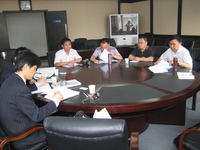 IRP visited the site of the 2008 Sichuan Earthquake to study the current recovery status and conduct a field survey about the role of the local community in the recovery process over the last 2 years.
IRP visited the site of the 2008 Sichuan Earthquake to study the current recovery status and conduct a field survey about the role of the local community in the recovery process over the last 2 years.
After meeting with reprsentaives of the Civil Affairs Department of Sichuan Provincial Government to learn the government policies on recovery and reconstruction including the Twinning Assistance Program, the research team composed of IRP staff members accompanied by the provincial government officials visited Penghua village located in Mianzhu City. This visit aimed examine the current situation as well as explore the role of local industries, especially wall painting and silk embroidery in the post disaster livelihood recovery process. The team also visited the "Mianzhu Wall Painting Training Center" which was constructed under the Jiangsu Twinning Assistance Program. The team interviewed the village head of Penghua Village, and some local residents regarding the current situation of earthquake recovery.
Then, the research team visited other severely affected areas including Beichuan region, which is home to the ethnic Qiang people. The team interviewed several residents in Jina village where the stone houses are constructed according to the ethnic Qiang traditional style, and also interviewed residents in Shiyi Village located in a high mountainous area where people are engaged in ethnic tourism business especially after the earthquake.
Based on the findings from this field survey and interviews, IRP is now compiling a report titled "International Comparison of Community Governance" which will be of great use for government policy makers engaging in post disaster recovery across countries.
(2010/06/04 14:00)
5-6 May, Singapore
The roundtable on Asian Regionalism was organized by the Asia Pacific Economic Cooperation (APEC) forum, Centre on Asia and Globalization (CAG) at the Lee Kuan Yew School of Public Policy and the Center for Strategic and International Studies (CSIS) on 5-6 may at the LKY School in Singapore. Many experts in the fields of energy security, climate change and natural disaster response attended the roundtable from across Asia.
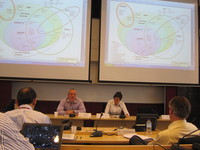 The Asian Disaster Reduction Center had been involved in the preparatory process to some extent, but the organizers invited Mr. Atsushi KORESAWA of the ADRC as one of the discussants in the session "Response to Natural Disasters." He presented why ADRC was established and how ADRC has been conducting its activities as one example of many regional/sub-regional organizations in Asia, especially focusing on its comparative advantages. The head of SAARC Disaster Management Centre in New Delhi and the executive director of the Pacific Disaster Center in Hawaii also participated in the session as discussants.
The Asian Disaster Reduction Center had been involved in the preparatory process to some extent, but the organizers invited Mr. Atsushi KORESAWA of the ADRC as one of the discussants in the session "Response to Natural Disasters." He presented why ADRC was established and how ADRC has been conducting its activities as one example of many regional/sub-regional organizations in Asia, especially focusing on its comparative advantages. The head of SAARC Disaster Management Centre in New Delhi and the executive director of the Pacific Disaster Center in Hawaii also participated in the session as discussants.
CSIS will produce a report by reflecting discussions at this forum. It has become certain hat disaster management has been gaining its importance in the context of the non-traditional security areas. However, it has been recognized that there are many disaster management related activities conducted by many different organizations which have some similarities or commonalities and thus some rationalization is required to make them more effective and useful.
ADRC will continue to conduct its activities in good collaboration with other organizations and focus on areas which ADRC has comparative advantages.
Note)
CAG: Centre on Asia and Globalisation, Lee Kuan Yew School of Public Policy, National University of Singapore
CSIS: Center for Strategic and International Studies, Washington
(2010/05/12 13:10)
21-22 December 2009 (Luangnamtha, Lao PDR)
The National Disaster Management Office (NDMO) of Lao PDR and the Asian Disaster Management Center (ADRC) organized a workshop for local government officials in Luangnamtha province on 21-22 December 2009. Some thirty officials from line departments of the province participated in the workshop together with three officials from the NDMO and one from ADRC.
This workshop is part of ASEAN project Capacity Building of Local Government Officials on Disaster Management, and the third one in the country followed by the workshops in Vientiane and Bolikhamxay provinces.
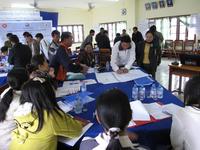 During the two-day workshop, the local officials took lectures on disasters and risks, legal framework of national and provincial disaster risk management, risk assessment and flood management based on the subjects lectured in the Training of Trainers (TOT) in June 2009 where the trainers had participated. Owing to the assistance of NDMO and provincial officials, the trainers gave lectures in instructive and interactive manners, bringing about active discussion and fruitful feedback.
During the two-day workshop, the local officials took lectures on disasters and risks, legal framework of national and provincial disaster risk management, risk assessment and flood management based on the subjects lectured in the Training of Trainers (TOT) in June 2009 where the trainers had participated. Owing to the assistance of NDMO and provincial officials, the trainers gave lectures in instructive and interactive manners, bringing about active discussion and fruitful feedback.
The ADRC hopes that the outcome of this project will be shared in other provinces and contribute to capacity development of local officials on disaster management throughout the country.
Similarly the workshops for local government officials are scheduled in early 2010 in Cambodia and Vietnam as the 1st year group countries in this project.
(2010/01/04 17:40)
28-30 October 2009 (Beijing, China)
The International Conference on the Social Mobilization for Catastrophic Disasters and the Formulation of Emergency Laws and Regulations was organized by the Ministry of Civil Affairs of China, was held on 28-30 October 2009 in Beijing, China. Mr. Fujieda, senior researcher of the ADRC was invited to participate in the conference.
Around 130 representatives from international organizations, ASEAN member countries, UK, USA, Canada, Australia, New Zealand, as well as Chinese government, regional institutions, NGOs, participated in the Conference.
The participants from different countries made presentations on the role of the government in the catastrophe emergency response, developments in the laws and regulations on disaster management and disaster-relief activities from their own perspectives. On the other hand, the participants from China including government, NGOs and other institutions, made presentations on roles of volunteers, communities and enterprises in relief activities in the case of Whenchuan Earthquake.
Mr. Fujieda made presentation on disaster management laws and systems and disaster emergency response system in Japan in the session titled "the Role of Government in Social Mobilization on Catastrophic Disasters and Laws and Regulation Development".
(2009/10/28 17:30)
11-14 August 2009 (Incheon, Republic of Korea)
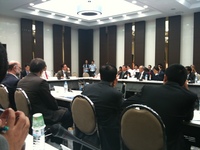
ADRC participated in this year's second meeting of the ISDR Asia Partnership (IAP) held in Incheon Metropolitan City, the Republic of Korea on 13-14 August 2009. The meeting discussed the follow-up action to the Second Session of the Global Platform on Disaster Risk Reduction (DRR), which was held 16-19 June 2009, the finalisation of the Kuala Lumpur Action Plan on DRR, and preparations for the Fourth Asian Ministerial Conference on Disaster Risk Reduction (AMCDRR), which will be held in Incheon Metropolitan City on 25-28 October 2010.
Dr. Yeon-Soo Park, Vice Administrator, the National Emergency Management Agency, the Republic of Korea, put forward his comprehensive proposal for the fourth AMCDRR in a very positive manner. He also detailed preparatory steps to be taken by various partners, i.e. member state governments, international organisations and other institutions.
Furthermore, participating organisations shared information on their recent attempts to follow up on the HFA midterm review, Kuala Lumpur Action Plan, etc. ADRC Executive Director Mr. Atsushi KORESAWA presented some of the ADRC's ongoing and future activities by putting a stress on the Asian Conference on Disaster Reduction 2010 (ACDR 2010) to be held in Kobe city, Hyogo Prefecture, Japan from 17-19 January 2010, back to back with other relevant meetings such as the IRP Recovery Forum. He also informed the participants that details of such events would be provided in due course on the website of ADRC.
In addition, ADRC had a chance to participate in the opening ceremony of the UNISDR Education and Training Institute for Urban Risk reduction and the UNISDR Northeast Asia Office, which was held on 11 August and the conference on "Building a Local governance Alliance for Disaster Risk Reduction" jointly hosted by UNSIDR and Incheon Metropolitan City.
(2009/08/25 17:40)
28-29 May 2009 (Chengdu, China)
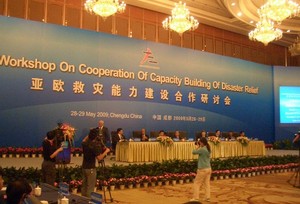
ASEM (Asia-Europe Meeting) Workshop on Cooperation of Capacity Building of Disaster Relief, organized by the Ministry of Civil Affairs and the Ministry of Foreign Affairs of China, was held on 28-29 May in Chengdu, China.
In the opening ceremony speech, Mr. Li Xueju, Minister of Civil Affairs of China noted that Europe and Asia should reinforce the exchanges of knowledge and experience and cooperation in disaster reduction and relief. Asian countries have rich experience in disaster relief, while the European countries possess advanced technology and management concepts. Both sides should overcome their own shortcomings by learning from each other's strong points.
Total of 160 representatives from 32 member countries of the Asia-Europe Meeting and international organizations are present at the workshop.
The workshop focused on four core thematic areas: (1) disaster preparedness and emergency relief; (2) rehabilitation and reconstruction; (3) public-private partnership in disaster relief; and (4) disaster reduction and risk management. ADRC made a presentation entitled "Build Back Better" to introduce the activities of its own and IRP(International Recovery Platform).
Participants also visited the earthquake-affected areas in Dujianyan, Sichuan Province.
(2009/06/05 19:20)
The ADRC participated in the 4th meeting of the Working-Group on Disaster Prevention and Preparedness which was jointly organized by United Nations Economic and Social Commission for Asia and the Pacific (UNESCAP), the World Meteorological Organization (WMO) Typhoon Committee Secretariat, and the National Emergency Management Agency of the Republic of Korea in Seoul on 8-29 April 2009.
The 22 participants who attended the meeting included representatives from China, Japan, Lao People's Democratic Republic, Malaysia, Philippines, Republic of Korea, Thailand, USA, Viet Nam, Hong Kong and Macao Special Administrative Regions, as well as representatives from the three organizing institutions.
During the meeting, participants discussed future activities of the working group, such as upgrade of the Typhoon Committee Disaster Information System (TCDIS), which is expected to be a useful typhoon- related disaster database for Asia. The ADRC gave a presentation on the role of GLIDE numbers, which are to be assigned to disasters contained in the individual databases of different organizations, and on the ADRC's contributions to the working group this year. The next meeting scheduled is the Integrated Workshop of the Typhoon Committee, to be held in the third week of September in the Philippines.
The Typhoon Committee has two other working groups on meteorology and hydrology, in addition to the working group on disaster prevention and preparedness.
(2009/05/13 12:20)
7-9 April 2009 (Chengdu, China)
The International Forum on Recovery and Reconstruction of Yingxiu, organized by Sichuan Provincial Construction Department, Guangdong Provincial Construction Department, Government of Aba Prefecture and China Academy of Building Research, was held in Chengdu, China, from 7 to 9 April, 2009. Three participants, headed by Mr. Suzuki, Executive Directive, from Asian Disaster Reduction Center (ADRC), one of the co-organizer, attended the forum. Please refer the file below for the detail.
Forum_Report_e.pdf
(2009/05/12 17:30)
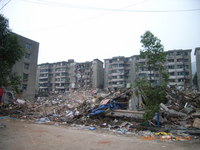
The Asian Disaster Reduction Center (ADRC), in cooperation with the Disaster Reduction and Human Renovation Institution (DRI), investigated ways for the lessons and experiences of the Great Hanshin-Awaji Earthquake with regard to recovery and restoration of disaster-stricken areas to be utilized in response to the Sichuan Province Earthquake that struck Wenchuan County in China's Sichuan Province (GLIDE no. EQ-2008-000062-CHN) on 12 May 2008. To conduct this investigation, ADRC Senior Researchers spent 25-30 May visiting the cities of Dujiangyan and Mianzhu in the disaster-stricken area to assess the situation on the ground and to share nformation with officials from the Sichuan Provincial People's Government, the China Earthquake Administration, and the National Disaster Reduction Center (NDRC) of the Ministry of Civil Affairs.
Further information, please refer to : http://www.adrc.asia/highlights/NewsNo183
(2008/06/03 20:00)


